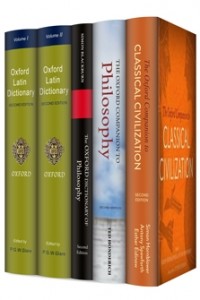For over 500 years, Oxford University Press has published authoritative works by the world’s leading scholars. With the five-volume Oxford Humanities Reference Collection, you can incorporate that renowned scholarship into your study. And if you pre-order this collection by September 4, you’ll get 56% off.
Here are 3 ways the Oxford Humanities Collection will enhance your study.
Follow the trajectory of religious and philosophical thought
Throughout the millennia, a variety of philosophies have waxed and waned in popularity. Understanding the development of philosophies and worldviews isn’t just important for grasping the history of Western civilization; it’s essential for engaging with prevailing worldviews in the modern marketplace of ideas.
The Oxford Companion to Classical Civilization explores the enduring influence of ancient Greece and Rome, detailing how everything from literature and drama to education and politics reverberate with the ideas of the ancient world. And because this collection includes the Oxford Companionto Philosophy and the Oxford Dictionary of Philosophy as well, you can follow the trajectory of philosophical and religious thought through the modern era. Along the way, you’ll equip yourself to grapple with modern challenges to Christianity and understand the ideas that shape the world we live in today.
Understand the historical context of the New Testament
It’s no secret: to truly grasp the teaching of Jesus and the Apostles you need to understand the world in which they lived. The New Testament came together at a time when diverse cultures, religions, worldviews, and philosophies were in collision. Biblical writers like Paul and John wrote out of this cultural milieu, and often in direct response to philosophical and religious concepts circulating around the ancient Roman world.
Further, many scholars have identified the influence of neo-Platonic ideas in the writings of Augustine and other Church Fathers. The resources in this collection uncover a depth of insight into the ideas that shaped the development of the New Testament and the early church.
Logos puts the scholarship of Oxford Companion to Philosophy and Oxford Dictionary of Philosophy right at your fingertips, helping you grasp the warp and woof of the philosophies and worldviews that influenced the New Testament world. Plus, with The Oxford Companion of Classical Civilization in your library, you’ll access lucid examinations of the politics, cultural customs, and myriad other aspects of everyday life in the Roman Empire.
Delve into classical Latin works
This collection includes the most up-to-date and authoritative Latin dictionary available: the Oxford Latin Dictionary, 2nd ed. Even if you spend most of your time studying English, Greek, and Hebrew resources, Oxford’s Latin Dictionary is still an essential resource. Why? Because for centuries Latin was the common language of the Western world. It was already prevalent during the time of Jesus and the Apostles—one of the placards identifying Jesus as “King of the Jews” at the crucifixion was written in Latin.
Further, some of the most important theological works ever published were penned in the language of the Romans—and the Oxford Latin Dictionary, 2nd ed. is a comprehensive reference work for Latin through the second century.
Even into the twentieth century, theological writers would extensively quote Latin works and terminology throughout their work, and many do to this day. As the study of Latin gradually faded from the curriculum of schools and universities, terminology that once required no explanation now leaves many readers puzzled.

***
You can pre-order the Oxford Humanities Reference Collection (5 vols.) now—but hurry! You can only get it for 56% off until September 4. Pre-order now.





